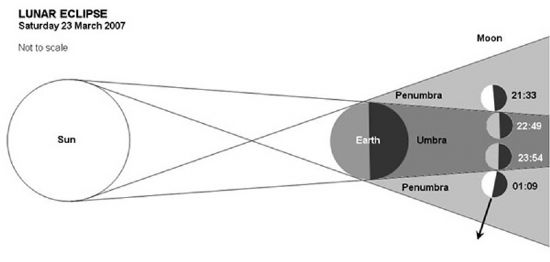Seeing Stars - Inverness Courier,Friday 2 March, 2007
Back to the Moon
By Maarten de Vries, Highlands Astronomical Society
It has been a while since there has been a good lunar eclipse. The last time was in the early morning of 28 October 2004. There was also a very unusual lunar eclipse that year on the 4th may, when the Moon rose fully eclipsed. But tomorrow (Saturday 3 March) it will happen again, and with the moon high up in the sky, it would be a good one to catch.
The eclipse proper will start at about half nine in the evening. The Moon will already be in the half shadow (penumbra) of the Earth by then, but this will not be very noticeable. The totality will start at about ten to eleven and last until shortly before midnight. The Moon will be back out of the full shadow (umbra) at ten past one in the morning of the 4th.

Although total lunar eclipses are not as rare as total solar eclipses, they are still worth observing. They are quite spectacular especially when conditions allow the Moon to take on an eerie reddish glow. In ancient times this phenomenon caused great concern, because it was thought the Gods were fighting and much blood was spilled in the heavens.
We know now that lunar eclipses happen when the Earth moves between the Moon and the Sun causing the sunlight to be blocked by the Earth. The Moon’s surface darkens considerably during this passage and takes on a reddish tint. The reason the moon doesn’t entirely disappear is because of the Earth’s atmosphere, which acts as a big lens. Sunlight hitting the Earth will refract when it hits the top of the atmosphere under an angle. This will happen again when the light leaves the atmosphere again. The result is that some of the sunlight will be bent around the Earth enough to hit the darkened Moon. But because red light refracts more strongly than all other colours, it is the red light that will predominantly reach the Moon and give it its reddish tint. This is exactly the same reason why the Sun turns red when it is close to the horizon.
If it was possible to experience this event from the moon, we would see a solar eclipse instead. But unlike a solar eclipse from the earth, the totality, i.e. the period that the Sun was covered entirely by the Earth, would last much longer, more than an hour in fact, unlike solar eclipses from earth, which last a maximum of about 5 to 6 minutes. The other difference would be that although the Sun would be completely invisible, the Earth’s limb would be visible as a very bright reddish ring. This strange ring of light would be bright enough to light up the surrounding areas. It would no doubt be a stunning sight.
The whole idea of watching the Sun getting eclipsed by the Earth is not so far fetched though. Astronauts may soon be able to witness a lunar eclipse on the Moon. Plans are well in progress to return to the Moon with a manned mission, possibly as soon as 2020, and there is much talk about possible permanent a permanent Moon base.
After a long period of complete disinterest in the Moon, there is suddenly an upsurge in planned missions. A whole flotilla of spacecraft is on the drawing board or in the process of being built right now. The first of these are to arrive at the Moon in 2008. Some of them will land and others will go in orbit. Their purpose is to find water on the lunar poles as well as suitable landing sites for future manned missions, or to see if there are Moonquakes etc. Even the UK are planning a mission which intends to find out about the structure of the Moon beneath its surface. The Moonlight mission hopes to be able to establish the facts by firing a suitcase sized dart at the Moon at nearly 700 miles an hour, which will penetrate the surface to a depth of 2 metres while sending back the information it gathers.
If you are interested in past and current Moon missions, Dr Ken MacTaggart from Inverness will be speaking about the Exploration of the Moon during a series of talks taking place as part of the Going Nova science event in Horizon Scotland in Forres on Saturday the 24th of March. More information about this event can be found by clicking on www.goingnova.org.